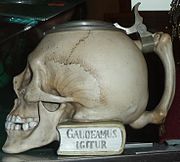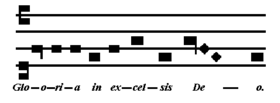List of Latin Phrases / G
Gallina / Gallinae
- Gallina scripsit.
- "A chicken wrote that." - Term for illegible cursive script in the pseudolus (1,1, 30) of the poet Plautus .
- Gallinae filius albae
- "Son of a white hen": lucky guy.
- Juvenal , Saturae 13,141. This idiom, which has not been proven otherwise, is based on the one hand on the belief that white hens would lay eggs less often (cf. e.g. Columella de re rustica 8,2,7), on the other hand to the conception of the color white as a color of happiness.
- The whole passage (v.140-142) reads in translation:
- "Do you think, my dearest friend, that you would be better because you are the son of a white hen, we just mean chicks hatched from bad luck eggs?"
Gallo / Gallus
- Gallo canente spes redit.
- “Hope returns when the cock crow .” - Ambrosius , hymn “Aeterne rerum conditor” v. 21st
- Gallus in suo sterquilinio plurimum potest.
- “The rooster counts most on his dung heap.” - Seneca , Apocolocyntosis 7.3.
- In this satire on the emperor Claudius it is said here in context that Claudius had authority in Rome, but in heaven he is insignificant.
Gallia

Gaul in the time of Caesar
- Gallia est omnis divisa in partes tres.
- "Gaul as a whole is divided into three parts.": The first sentence from the Gallic War of the general Gaius Iulius Caesar , which is familiar to many Latin students. The whole quote reads as follows: "Gallia est omnis divisa in partes tres, quarum unam incolunt Belgae, aliam Aquitani, tertiam qui ipsorum lingua Celtae, nostra Galli appellantur." ("Gaul is divided in its entirety into three parts, one of which is inhabited by the Belgians." , the second the Aquitans, the third the people called Celts in the local language, we call them Gauls. ")
- Gallia Rebellis
- "Rebellious Gaul": Title of a book by Ralf Urban with the subtitle "Elevations in Gaul in the mirror of ancient evidence" .
Gaudeamus
- Gaudeamus igitur
- "Let's rejoice": beginning of the most famous traditional student song in the world, the first stanza of which reads as follows:
|: Gaudeamus igitur
iuvenes dum sumus: |
post iucundam iuventutem,
post molestam senectutem,
|: nos habebit humus!: |
So we want to be happy
while we are still young people.
After a happy youth,
after a difficult old age
, the earth will have us.
Fun
- Gaudium laboris acti
- "Joy about the work done"
Generalibus
- Generalibus specialia derogant
- “Special law breaks general law.”: As much as Lex specialis derogat legi generali .
Generatio
- Generatio aequivoca
- "Ambiguous generation" - also called generatio spontanea , describes spontaneous generation , i.e. H. the emergence of life from non-living materials.
genius
- Genius loci
- “Spirit of the place”: Associated with this is the hope that it will have an inspiring effect if, for example, someone believes they can write better at Goethe's birthplace.
Gens
- Gens una sumus.
- "We are a family": the motto of the international chess federation FIDE .
genus
- Genus hominum compositum est ex corpore et anima.
- “The human species consists of the body and the rational soul.” - Sallust , Bellum Iugurthinum 2,1.
- Genus irritabile vatum
- “The irritable sex of the poets”: Horace , epistulae 2,2,102
gladiator
- Gladiator in arena capit consilium.
- "The gladiator makes his decision in the arena."
- The sentence goes back to Seneca , Epistulae morales 22.1: "An old saying goes , (only) in the arena does the gladiator make his plan."
Gladium / Gladius
- Gladium dedisti, qui se occideret.
- “You gave him a sword so that he might kill himself.” - Plautus , Trinummus 129.
- Basically: you led him to black ice. - In the original this sentence is an outraged question: "Dedistine hoc facto ei gladium, qui se occideret?" ("You gave him a sword with it that he would kill himself?")
- Gladius ultor noster
- “The sword, our avenger” - a common weapon slogan of student associations who are diligent about their size
Gloria
- Gloria crocodilus.
- “Fame is a crocodile.” - If you follow fame, it will flee; if you flee from him, he follows you.
- Gloria (enim) Dei vivens homo, vita autem hominis visio Dei.
- “The glory of God is the living man, but the life of man is to see God.” - Irenaeus of Lyon , Adversus haereses 4,20,7
- Gloria in excelsis deodorant.
- “Glory to God on high” - initial words of the Gloria in the Catholic liturgy ; according to the Gospel of Luke . From the Christmas story in the New Testament:
- “ Gloria in excelsis Deo et in terra pax in hominibus bonae voluntatis. "
- “ Glory (be) to God in the heights and peace on earth to people of good will! "
- Gloria victoria
- "Fame (and) Victory"
- Gloria virtutem tamquam umbra sequitur.
- "Fame follows virtue like a shadow."
Gloriosus
- Gloriosus Deus
- “Glorious God” - Mass by Michael Haydn

Coat of arms of the Canadian province of Manitoba : Gloriosus et liber
- Gloriosus et liber
- "Glorious and Free" - the motto of the Canadian province of Manitoba
Gradatim
- Gradatim ferociter
- "Step by step, firmly determined" - the motto of the private US space company Blue Origin
Gradus
- Gradus ad Parnassum
- “Steps to Parnassus”: In ancient Greece, Parnassus was the seat of the muses . The Gradus ad Parnassum are systematically structured textbooks for artists, especially poets and musicians.
Graeca
- Graeca non leguntur.
- “Greek is not read.” - Something is too difficult, you have to leaf through it.
- The sentence refers to the practice of pre-humanistic lectures. Because the teachers usually could not speak Greek, Greek passages were left out in the traditional text collections, both when copying and when speaking.
Graecia
- Graecia capta ferum victorem cepit et artes intulit agresti Latio.
- “Conquered Greece conquered the wild victor and brought the arts to rural Latium.” - Horace , Epistulae 2,1,156f.
Grief
- gramine persecuto
- "When grass has grown over it"
- Palladius writes in his agricultural textbook Opus agriculturae ( work on agriculture ) 3,26,5 that it is best to drive the pigs to the vines when they are not yet in the juice, or only after the harvest, “when grass has grown back is ".
Grammatica
-
Gram loquitur, Dia vera docet, Rhe verba colorat,
Mus canit, Ar numerat, Geo ponderat, As docet astra. - "The grammar speaks, the dialectic teaches the true, the rhetoric colors the words,
the music sings, the arithmetic counts, the geometry measures, the astronomy teaches the stars." - Merkvers ( hexameters ) for the Septem artes liberales , the Seven Free Arts of scholasticism . - The first hexameter lists the arts of the trivium , the second those of the quadrivium . In order to adhere to the hexameter meter , the arts are given in abbreviated form:
- Gram: Grammar, Dia: Dialectic, Rhe: Rhetoric, Mu: Music, Ar: Arithmetic, Geo: Geometry, As: Astronomy
Grammatici
- Grammatici certant et adhuc sub iudice lis est.
- “The grammarians are arguing and the dispute is still before the judge.” - The matter has not yet been decided. (A hexameter of Horace )
- "Grammatici certant" is also quoted in abbreviated form, which means "The scholars have not yet agreed on this."
Gratia
- Gratia supponit naturam.
- “Grace presupposes nature.” - This thought from Bonaventure says that the striving for God is inherent in man. His contemporary Thomas Aquinas then developed this line of thought further.
- Gratia gratiam parit.
- "Favor creates favor."
- Gratiam maximam habere
- “Knowing thanks.” - Be grateful.
Free
- Free
- free of charge , without payment, free of charge
- Derived from gratīīs - "for mere thanks" (in the Latin ablative plural : "for thanksgiving"; to gratia ).
Grosso
- Grosso modo
- “With a rough measure”: Approximately, more or less.
Gutta
- Gutta cavat lapidem, consumitur anulus usu.
- “The drop wears away the stone, a ring is consumed by use.” - Ovid , Epistulae ex Ponto (4,10,5).
- Gutta cavat lapidem, non vi, sed saepe cadendo.
- "The drop wears away the stone, not through its force, but through its frequent falling." Shortened to "Constant dripping wears away the stone".
- Gutta fortunae prae dolio sapientiae.
- "A drop of luck goes over a barrel of wisdom."
Good
- Guttam alicui aspergere
- "Splash someone's throat with a drop" - give someone a tiny bit.
- In his collection of proverbs, Adagia, Erasmus von Rotterdam traces this saying back to a speech by Cicero. If this idiom did not already have the character of a proverb, then it was at least impressed as a snappy bon mot with which Cicero describes the attempt to bribe a judge.
Individual evidence
- ^ Libros quinque adversus haereses - HathiTrust Digital Library
- ↑ Alan Boyle: Gradatim Ferociter! Jeff Bezos explains Blue Origin's motto, logo ... and the boots. In: GeekWire. October 24, 2016, accessed October 14, 2018 .
- ↑ Horace, Ars poetica 78
- ^ Cicero , oratio pro Cluentio ( Defense speech for Cluentius ) 71
- ↑ Cicero's bon mot is untranslatable, but is explained by Erasmus: Erasmus , Adagia 1489.




